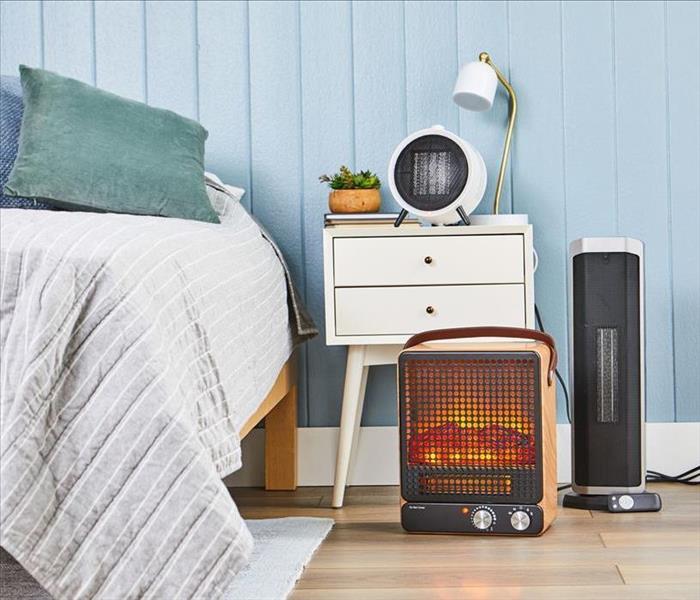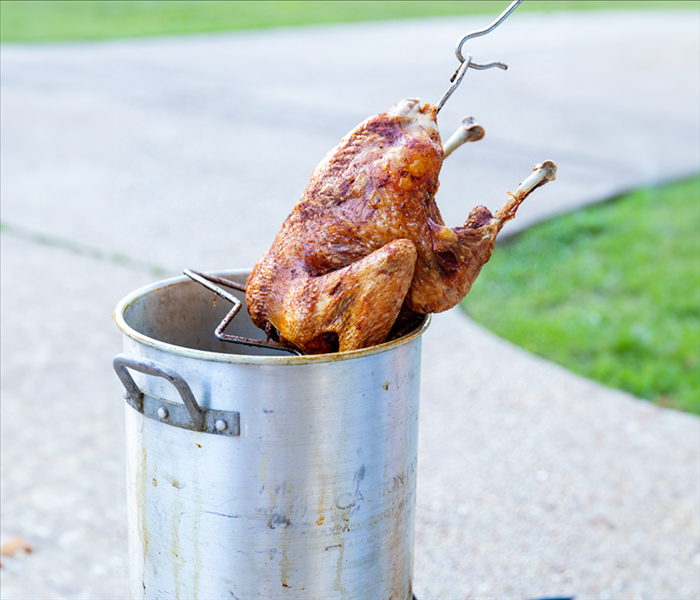Recent General Posts
Winterizing Your Pipes: Preventing Burst Pipes and Water Damage
12/3/2024 (Permalink)
Winter weather can be harsh on your home's plumbing system. Freezing temperatures can cause pipes to freeze and burst, leading to significant water damage. By taking a few preventive measures, you can protect your home from this costly problem.
Here are some essential tips to winterize your pipes:
Insulate Exposed Pipes:
- Wrap exposed pipes with insulation, especially those located in unheated areas like basements, attics, and crawl spaces.
- Use pipe insulation foam or heat tape to keep pipes warm.
Seal Up Drafts:
- Caulk and weatherstrip around windows and doors to prevent cold air from entering your home.
- Check for any gaps around pipes where cold air can seep in.
Let Faucets Drip Slightly:
- A slow trickle of water can help prevent pipes from freezing.
- However, be mindful of water waste and adjust the flow as needed.
Open Cabinet Doors:
- Open cabinet doors under sinks to allow warm air to circulate around the pipes.
Disconnect Outdoor Hose:
- Disconnect garden hoses from outdoor faucets and turn off the water supply to those faucets.
- Drain any remaining water from the hoses and faucets.
Professional Inspection:
- Consider hiring a professional plumber to inspect your plumbing system and identify potential problem areas.
By following these simple tips, you can significantly reduce the risk of burst pipes and protect your home from water damage. Remember, prevention is key, so take the time to winterize your pipes before the cold weather arrives.
Need Help with Water Damage?
If you experience a burst pipe or water damage, contact SERVPRO. Our team of experts is available 24/7 to provide prompt and efficient water damage restoration services.
Stay Warm and Safe: Indoor Heater Safety Tips for the Holiday Season
12/3/2024 (Permalink)
As the temperature drops, many of us rely on indoor heaters to stay cozy during the holiday season. However, it's important to use these appliances safely to prevent accidents and fires. Here are some tips to keep you and your family safe:
General Safety Tips:
- Regular Maintenance: Schedule regular maintenance checks for your heating system to ensure it's operating efficiently and safely.
- Keep a Safe Distance: Maintain a safe distance between heaters and flammable materials like curtains, furniture, and papers.
- Never Leave Heaters Unattended: Always turn off heaters when you leave the room or go to sleep.
- Proper Ventilation: Ensure proper ventilation to prevent carbon monoxide buildup.
Specific Heater Safety Tips:
- Portable Heaters:
- Place portable heaters on a hard, level surface away from foot traffic.
- Use the correct type of fuel for your heater and follow the manufacturer's instructions.
- Never use extension cords with portable heaters.
- Space Heaters:
- Keep space heaters away from walls, furniture, and other heat sources.
- Use a timer to automatically turn off the heater after a set period.
- Fireplace Safety:
- Use a fireplace screen to prevent sparks from escaping.
- Never burn wrapping paper or other flammable materials in a fireplace.
- Clean your chimney regularly to reduce the risk of creosote buildup.
By following these safety tips, you can enjoy a warm and safe holiday season. Remember, prevention is key.
Stay Warm and Safe: Heater Safety Tips for Winter
1/8/2024 (Permalink)

Stay Warm and Safe: Heater Safety Tips for WinterAs the winter chill sets in, many of us turn to heaters for a quick burst of warmth. But while heaters can be a lifesaver during cold snaps, it's crucial to prioritize safety when using them. Here are some key tips to keep you and your loved ones safe all winter long:
General Safety:
- Keep it Clear: Maintain a 3-foot "No-Burn Zone" around all heaters. This includes furniture, curtains, bedding, and anything else that could catch fire.
- Plug it Right: Never overload outlets. Plug space heaters directly into a wall socket; avoid using extension cords or power strips.
- Tip-Over Protection: Choose heaters with automatic shut-off features that activate if tipped over. This is especially important in homes with pets or children.
- Smoke and CO Alarms: Ensure your smoke and carbon monoxide detectors are functioning properly. Test them monthly and replace batteries as needed.
- Never Leave Unattended: Turn off and unplug heaters when leaving the room or going to bed.
Space Heater Safety:
- Electric vs. Fuel-Burning: Electric heaters are generally safer than fuel-burning models, as they don't produce carbon monoxide. However, electric heaters can still pose fire risks.
- Choose the Right Type: Select a heater with the appropriate wattage for the room size. Using an underpowered heater can cause it to overheat.
- Regular Maintenance: Inspect cords and plugs for damage before each use. Keep the heater clean and free of dust and debris.
Additional Tips:
- Consider Alternatives: If possible, use your central heating system for primary heating and space heaters for supplemental warmth.
- Dress in Layers: Wearing warm clothing can help reduce your reliance on heaters.
- Close Drafts: Seal leaks around windows and doors to prevent cold air from entering and improve heating efficiency.
By following these safety tips, you can enjoy the benefits of heaters without compromising your safety. Remember, a little caution goes a long way in preventing wintertime accidents.
Ensuring Turkey Fryer Safety for the Holidays
1/3/2024 (Permalink)
Ensuring Turkey Fryer Safety for a Happy Holiday Season
The holidays are a time for family, friends, and of course, a delicious turkey feast. While many families enjoy the tradition of deep-frying their turkeys, it is important to be aware of the potential safety hazards involved. SERVPRO, a leading provider of fire damage restoration services, is committed to helping families have a safe and enjoyable holiday season by providing turkey fryer safety tips.
Turkey Fryer Safety Tips
- Choose the Right Fryer: Always use a turkey fryer specifically designed for outdoor use. Never use an indoor turkey fryer, as they pose a high risk of fire.
- Use a Safe Location: Place your turkey fryer at least 10 feet away from any structures or combustible materials. Never operate a turkey fryer in a garage, shed, or any enclosed area.
- Keep Away from Flammables: Keep any flammable materials, such as propane tanks, gasoline, or lighter fluid, away from your turkey fryer.
- Fill with Proper Oil: Use only the recommended type of oil for your turkey fryer. Never overfill the fryer, as this can increase the risk of overflowing.
- Thaw the Turkey Completely: A partially frozen turkey can cause the oil to splatter and ignite. Always thaw your turkey completely before frying.
- Lower the Turkey Slowly: Slowly lower the turkey into the hot oil to avoid splattering.
- Never Leave the Fryer Unattended: Never leave a turkey fryer unattended while it is in operation. Always have a fire extinguisher nearby in case of an emergency.
- Dispose of Oil Properly: Once the turkey is cooked, allow the oil to cool completely before disposing of it. Never pour hot oil down the drain.
SERVPRO's Commitment to Safety
SERVPRO is committed to helping families have a safe and enjoyable holiday season by providing turkey fryer safety tips and fire damage restoration services in case of an emergency. With over 50 years of experience, SERVPRO has the expertise and resources to help you recover from a fire quickly and efficiently.
Enjoy a Safe and Happy Holiday
By following these turkey fryer safety tips, you can help prevent fires and ensure a safe and happy holiday season for you and your family. SERVPRO wishes you a safe and enjoyable holidays!






 24/7 Emergency Service
24/7 Emergency Service



